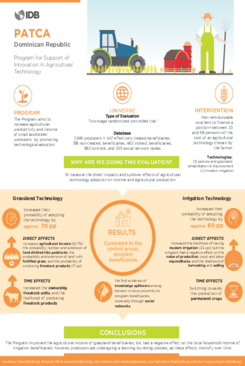PATCA Dominican Republic: Program for Support of Innovation in Agricultural Technology
Date
Jun 2019
EDITOR
Perez, Darrel
This paper estimates the impact of an agricultural technology adoption program on agricultural production and income using an experimental approach. The context of analysis is the Program for the Support of Innovation in Agricultural Technology (PATCA II) implemented in the Dominican Republic. The program aimed to increase the agricultural productivity and income of smallholder farmers by encouraging the adoption of a technology. We exploit a two-stage randomized experiment conducted at the geographic- and farmer-level to evaluate the effects of adopting improved pasture and irrigation technologies using an instrumental variable (IV) analysis to recover the local average treatment effect (LATE). To measure the effectiveness of the program, we combined rich microeconomic data obtained from a comprehensive household survey with administrative data to measure both direct and spillover effects. The sample includes 2,499 farmers, including direct beneficiaries, indirect beneficiaries, controls, and farmers within the social network of direct beneficiaries. We find different patterns of adoption and significant impacts on production-related outcomes for both of the technologies analyzed. The results show adoption of improved pastures increased agricultural income and that the effects intensify over time. In the case of irrigation, treatment had adverse effects on total household income and agricultural production; however, there is evidence of a change in the production portfolio of program beneficiaries from temporary to permanent crops as a function of time of exposure to the technology. Whereas irrigation can be implemented immediately after treatment, income benefits take time to materialize, for instance, as permanent crops reach the initial point of harvest or maturity. These results imply the existence of a dynamic learning-by-doing process. Also, the assessment of indirect or spillover effects validate the hypotheses that knowledge spillovers might take place among farmers in close proximity to program beneficiaries, especially through social networks. The results present evidence that liquidity constraints are critical determinants of technology adoption for smallholder farmers in the Dominican Republic.




